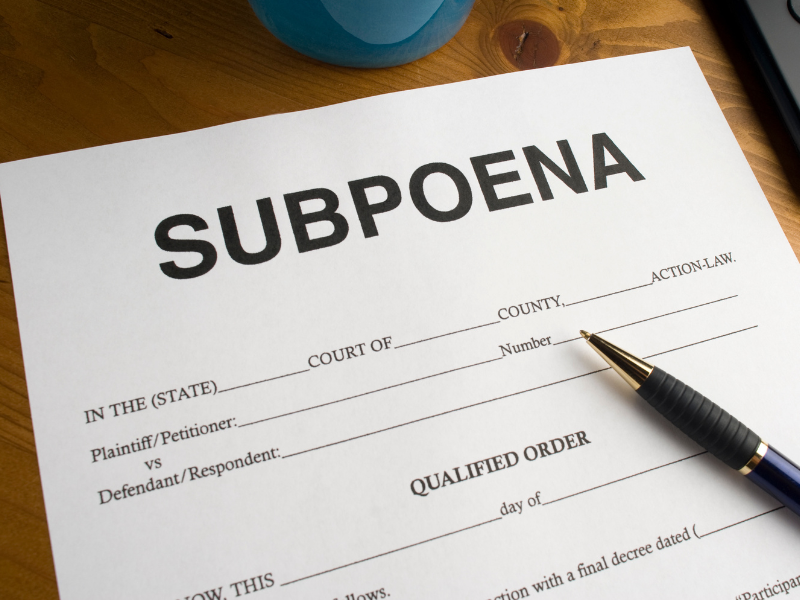HIPAA subpoenas play a pivotal role in patient privacy and compliance. Under the Health Insurance Portability and Accountability Act (HIPAA), healthcare providers may face subpoenas demanding the disclosure of protected health information (PHI).
This article will focus on HIPAA subpoenas, exploring their different types, implications, and strategies for navigating their complexities while safeguarding patient privacy. You will also learn more about the significance of HIPAA as a federal law protecting medical information, examine scenarios where subpoenas are encountered, and gain insights into how to handle these situations appropriately.
Table of Contents

What Is a HIPAA Subpoena?
A HIPAA subpoena is a legal document issued by a court or administrative agency that demands the production of medical records or the testimony of healthcare professionals. Its purpose is to obtain PHI for use in a legal proceeding, such as a civil lawsuit, criminal investigation, or administrative hearing.
HIPAA subpoenas must comply with the privacy regulations outlined in the HIPAA Privacy Rule to ensure the confidentiality and security of patient information.
Types of HIPAA Subpoenas
There are two primary types of HIPAA subpoenas: subpoenas for document production and subpoenas for testimony.
1. Subpoenas for document production
These subpoenas require healthcare providers to disclose a patient’s medical records or other relevant documents. The requesting party typically seeks these records to gather evidence or support their case. Healthcare providers must ensure compliance with HIPAA regulations when disclosing PHI, including obtaining patient consent or relying on applicable exceptions.
When a healthcare provider receives a HIPAA subpoena for medical records, it is vital to evaluate its scope and legitimacy. The subpoena should specify the information requested, the purpose for which it is sought, and the time frame for compliance. Healthcare providers should follow proper procedures to protect patient privacy and ensure compliance with HIPAA regulations when disclosing PHI.
2. Subpoenas for testimony
In some legal proceedings, healthcare professionals may be summoned to provide testimony regarding patient treatment, medical opinions, or other related matters. Subpoenas for testimony may require the healthcare provider to appear in court, deposition, or other legal proceedings to provide information under oath. It is essential to handle such subpoenas carefully to ensure confidentiality is preserved.
Similar to subpoenas for medical records, HIPAA subpoenas for testimony require healthcare professionals to provide sworn statements or testimonies regarding patient care. It is crucial to evaluate the validity of the subpoena and ensure that the requested information falls within the scope of the legal matter. Healthcare professionals should consult legal counsel to determine their obligations and the appropriate response.

Responding to a HIPAA Subpoena
When faced with a HIPAA subpoena, healthcare providers must respond promptly while also balancing the need for compliance with patient privacy protection.
The following steps can help navigate this process effectively:
- Consult legal counsel: Seek guidance from legal professionals experienced in healthcare law to understand the legal implications and potential responses.
- Verify the subpoena: Examine the subpoena for any irregularities, ensuring it is properly issued and complies with applicable legal requirements.
- Notify the patient: Inform the affected patient about the subpoena and their rights regarding their medical information. Discuss the potential advantages and disadvantages.
- Evaluate compliance: Determine whether the requested information falls within the subpoena’s scope and whether it complies with the HIPAA subpoena requirements.
- Document the process: Keep detailed records of all communications, actions taken, and disclosures made in response to the subpoena.
Verifying the subpoena’s validity
Healthcare providers must carefully verify the legitimacy of a subpoena before disclosing any PHI. Factors to consider when assessing the validity of a subpoena include the following:
- The issuing court’s jurisdiction
- The requesting party’s authority
- Whether the subpoena meets the necessary legal standards. It is advisable to consult legal counsel to ensure proper verification and compliance.
Safeguarding Patient Privacy in the Face of Subpoenas
HIPAA puts significant emphasis on protecting patient privacy and the security of their medical information. When responding to subpoenas, healthcare providers need to take appropriate actions to safeguard patient privacy, such as:
- Minimizing Disclosure: Only disclose the minimum necessary PHI required by the subpoena. Avoid sharing unrelated or extraneous information to limit potential privacy breaches.
- Secure transmission: Ensure that any PHI shared in response to a subpoena is transmitted securely, using encrypted methods to protect it from unauthorized access.
- Confidentiality agreements: Consider requesting confidentiality agreements from the parties involved in the legal proceedings to ensure that the shared PHI remains confidential and is used solely for specified lawful purposes.
- Redaction: When disclosing medical records, redact any information that is not relevant to the legal matter, such as sensitive mental health details or unrelated medical conditions.
- Restricted access: Limit access to the disclosed PHI to those directly involved in the legal proceedings. Implement strict controls to prevent unauthorized dissemination or use of the information.

Understanding Subpoena Exceptions and Objections
In certain circumstances, healthcare providers may have valid exceptions or objections to a subpoena. These exceptions or objections could include the following:
- Lack of proper authorization: If the subpoena lacks the necessary patient authorization or fails to meet HIPAA requirements, healthcare providers may object to its validity.
- Overbreadth or relevance: If the requested PHI extends beyond what is relevant to the legal matter or the scope of the subpoena is overly broad, healthcare providers may object and seek to limit the disclosure.
- Privileged information: Patient information protected by other legal privileges, such as attorney-client or psychotherapist-patient privilege, may be subject to objection and withholding.
- Undue burden or hardship: If complying with the subpoena imposes an unreasonable burden on the healthcare provider or compromises patient care, complaints based on undue burden or hardship may be raised.
Safeguarding Patient Privacy With HIPAA Subpoena Compliance
HIPAA subpoenas present a challenge for healthcare providers, balancing legal obligations to disclose information while protecting patient privacy. By understanding the types of subpoenas, verifying their validity, and following proper procedures, healthcare providers can navigate this complex landscape while upholding the principles of HIPAA.
It would also be best to consult legal professionals to ensure HIPAA subpoena compliance and protect patient privacy. Their expertise will help navigate the legal requirements and ensure that the necessary steps are taken to secure and confidentially handle sensitive medical information in legal proceedings.







